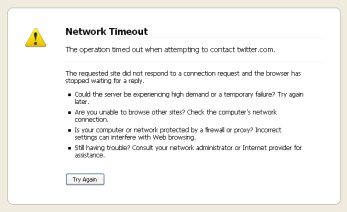Twitter blackout confirmed as denial-of-service attack

Tweets fall silent for hours as DDoS rages
Twitter was inaccessible for several hours on Thursday, followed by a period of slowness and sporadic timeouts, and more outright downtime. The microblogging site is blaming an "ongoing" denial-of-service (DoS) attack but has not said anything further.
Judging by the timeline of my TweetDeck client, it looks like the problems started right around 14:00(BST).
"We are determining the cause and will provide an update shortly," Twitter's staff posted at 14:43 on the service's status blog.
Then, around 15:49, the company posted: "We are defending against a denial-of-service attack, and will update status again shortly."

Around 16:15, the status blog post was updated with "The site is back up but we are continuing to defend against and recover from this attack." (I still was unable to access Twitter.)
Way back when, Twitter outages were so commonplace that it was worth reporting when it didn't crash - as when it stayed afloat during the entire South by Southwest Interactive Festival in 2008. Now, a few million dollars of venture capital later, the service is far more stable.
This is problematic, because Twitter wants to establish itself as a communications standard rather than just a social media brand. It's been a crucial platform for information exchange in the face of global events where more traditional means of broadcasting have been inaccessible or blocked.
A denial-of-service attack occurs when hackers overload a web service's infrastructure with data, making its servers slow to a crawl or crash altogether.
There have been a notable number of DOS attacks recently in the social-media space: On Wednesday, URL shortener Tr.im claimed that one such attack rendered its truncated URLs inaccessible for some time; earlier in the week, blog network Gawker Media was downed by an attack that targeted The Consumerist, a property that it recently sold but still hosts on its servers.
There has been no indication that any of these various attacks are connected. But it's probably not a coincidence that they all coincide with the annual Defcon hacker convention.